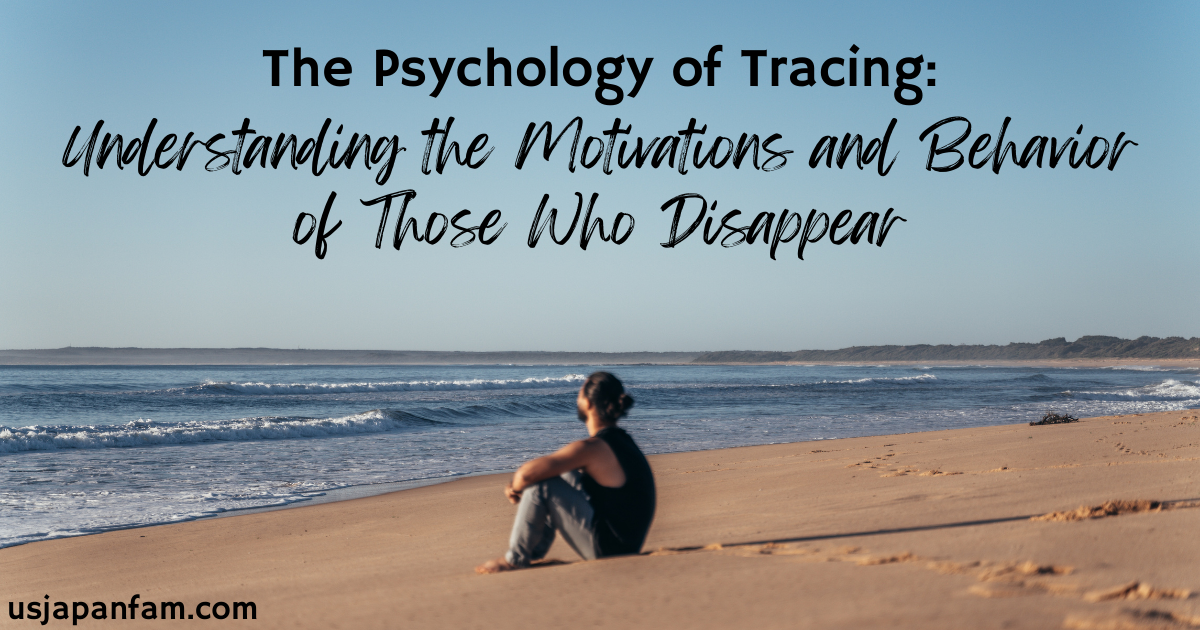The Psychology of Tracing: Understanding the Motivations and Behavior of Those Who Disappear10/17/2023
Guest post sponsored and provided by Rhinorank.
Have you ever wondered why some people vanish from our lives, leaving us puzzled and worried? The psychology behind disappearing acts is a fascinating subject that delves into the complexities of human behavior. Specialist agents for tracing aim to understand this to try and find those who leave without a trace.
Why Do People Disappear?
The Escape Artists Sometimes, individuals choose to disappear as a means of escaping their current circumstances. This can include escaping from:
The Desire for Freedom Human beings inherently crave freedom and independence. Some people choose to disappear to regain a sense of control over their lives. They may feel trapped in their current routine or environment, prompting them to take drastic measures to break free. Identity Crisis An identity crisis can lead to disappearing acts. Individuals who are grappling with their sense of self may choose to leave behind their old life in search of a new identity or purpose. This can be a deeply personal journey where they aim to find themselves or redefine who they want to be. The Need for Solitude Introverts, in particular, may disappear from social circles to recharge their mental and emotional batteries. The overwhelming nature of social interactions can push some people to seek solitude. Disappearing temporarily can help them find the peace and quiet they need to introspect and heal.
Understanding the Behavior of Those Who Disappear
Now that we've explored the motivations behind disappearing acts, let's delve into the behaviors and actions that accompany these decisions. Cutting Ties When someone decides to disappear, one of the first things they often do is cut ties with friends, family, and acquaintances. This can involve:
Changing Identity Some individuals go to great lengths to change their identity when they disappear. This can include:
Relocating To disappear successfully, one often needs to change their physical location. This may involve:
Maintaining a Low Profile People who disappear become masters of staying under the radar. They avoid activities that could draw attention, such as:
Fading from Memory Over time, those who disappear may fade from the collective memory of their former social circles. This is achieved by:
The Emotional Toll of Disappearing
While disappearing may seem like an adventure or an escape, it often takes a considerable emotional toll on the individuals involved. Let's explore the emotional aspect of vanishing acts. Loneliness Living in isolation and cutting ties with loved ones can lead to profound loneliness. Even if the disappearance was voluntary, feelings of isolation can become overwhelming. Guilt and Regret Individuals who disappear may experience guilt and regret for leaving their old life behind. This is especially true if they had strong emotional connections with the people they left behind. Anxiety The constant fear of being discovered can cause anxiety and paranoia. Every interaction or encounter with a familiar face can trigger anxiety for those who have disappeared. Loss of Identity The process of assuming a new identity can lead to a loss of one's sense of self. People may struggle with their new personas, causing internal turmoil.
The Search for Answers
People who vanish often leave behind a trail of unanswered questions. Friends, family, and law enforcement agencies may initiate searches to find them. The search for answers can take various forms: Private Investigators Some hire private investigators to locate the missing person. These professionals use various tactics, including surveillance and information gathering, to track down the individual. Social Media Sleuthing In the digital age, social media can be a powerful tool for those searching for missing loved ones. Friends and family may create online campaigns or share information in the hope of finding clues. Law Enforcement Involvement When a disappearance is deemed suspicious or involves criminal activity, law enforcement agencies step in to investigate. This can lead to extensive searches and investigations. Missing Persons Databases Many countries maintain databases of missing persons, making it easier for concerned parties to report and search for missing individuals.
The Emotional Rollercoaster of Reunion
In some cases, disappeared individuals eventually return to their old lives. This reunion can be emotionally complex for all parties involved. Joy and Relief The return of a disappeared loved one often brings overwhelming joy and relief to friends and family. It's a time of celebration and healing. Reconciliation Reuniting after a disappearance can lead to reconciliation and forgiveness. It's an opportunity for individuals to address the issues that led to the disappearance in the first place. Lingering Questions Even after a reunion, there may still be unanswered questions and lingering emotional scars. It takes time and effort to rebuild trust and understanding.
Conclusion
Understanding the motivations and behaviors of those who disappear can help us approach these situations with empathy and compassion, recognizing that there are often deeply personal reasons behind these vanishing acts.
2 Comments
Gary
2/23/2024 01:16:22 pm
I am thinking of disappearing from my life. I have many of the problems described. Plus I lost my dad a bit of a year ago. I've nothing to look forward to.
Reply
Leave a Reply. |
About ME:I'm a NYC metro area mom blogger living in NJ with my Japanese husband & our 3 kids (twins plus 1), focusing on fun and honest product and travel reviews, saving moms time finding the best for their families! Find what you need in the menu bar or search section above! Categories
All
Archives
July 2024
|












 RSS Feed
RSS Feed



